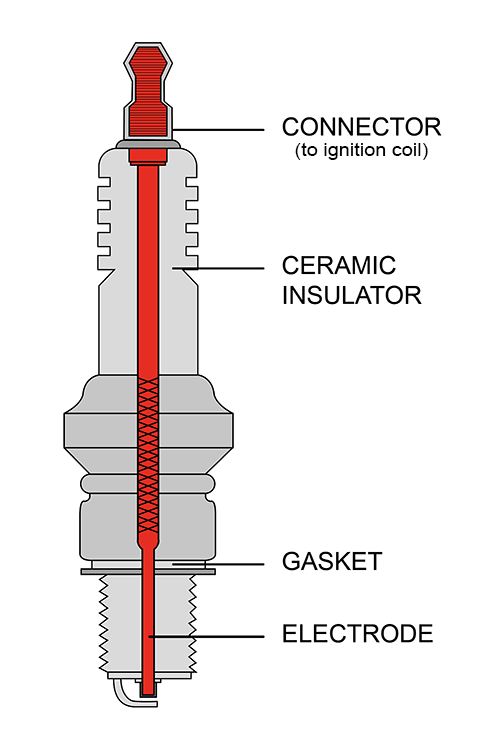Have you ever popped the hood of your car and wondered about the tiny components that make it all run smoothly? One of those critical parts is the spark plug.
But do all cars have them? You might be surprised to learn that not every vehicle relies on these little ignition wonders. Whether you’re curious about your electric, diesel, or hybrid vehicle, understanding the role of spark plugs and their alternatives could save you time, money, and a lot of frustration.
We’ll explore which types of vehicles need spark plugs and which ones do not. We’ll delve into the inner workings of electric and diesel cars, and even touch on hybrid vehicles and lawn mowers. You’ll discover why some vehicles don’t need spark plugs at all and what that means for your driving experience. By the end, you’ll have a clear understanding of how these components fit into the world of automobiles and what it means for your own vehicle. Stay tuned—you’re about to learn something every car owner should know!

Credit: www.chase.com
Do Electric Cars Have Spark Plugs
Electric cars do not have spark plugs. These vehicles use electric motors instead of internal combustion engines. Spark plugs are only found in traditional gasoline-powered cars.
Cars traditionally rely on spark plugs to ignite fuel in the engine. But what about electric cars? They function differently, leading many to ask if they have spark plugs. Let’s explore this topic further.
Electric Cars And Spark Plugs
Electric cars operate using a different system. They rely on electric motors for power. This means they don’t need spark plugs. Here’s why:
- Electric Motor System: Electric cars have motors powered by electricity. This system eliminates the need for spark plugs.
- Battery-Powered: A large battery supplies energy to the motor. No combustion engine means no spark plugs.
- Simplified Mechanism: The absence of spark plugs simplifies maintenance. Electric cars require fewer parts than traditional vehicles.
How Electric Cars Generate Power
Understanding how electric cars generate power is essential. They use electricity stored in batteries. This process contrasts sharply with combustion engines:
Electric cars convert stored electrical energy into motion. This occurs through the electric motor. The battery stores energy, which the motor uses to propel the vehicle. This system operates without the need for spark plugs, reflecting a fundamental shift from conventional cars.
Advantages Of Electric Cars Over Combustion Engines
Electric cars offer several benefits over traditional engines. Their design and operation bring unique advantages:
- Efficiency: Electric cars convert more energy into motion. This results in better efficiency compared to combustion engines.
- Environmental Impact: They produce zero emissions. This helps reduce air pollution.
- Maintenance: Fewer moving parts mean less maintenance. Spark plugs, oil changes, and exhaust issues are eliminated.
Why Spark Plugs Are Not Needed
The absence of spark plugs in electric cars is logical. Here’s why spark plugs are unnecessary:
Electric cars don’t have internal combustion engines. Spark plugs are vital for igniting fuel in combustion engines. Since electric cars use battery power, spark plugs play no role. This change marks a significant shift in automotive technology.
Do Diesel Cars Use Spark Plugs
Not all cars use spark plugs. Diesel engines, for example, rely on compression to ignite fuel. This means they don’t require spark plugs, unlike gasoline engines which do. Understanding the differences in engine types helps in maintaining your vehicle better.
Cars come in many types, each with unique features. One common part is the spark plug, found in most vehicles. But? Let’s explore this intriguing aspect of diesel engines.
Understanding Diesel Engines
Diesel engines work differently than gasoline engines. They rely on a unique combustion process:
- Compression Ignition: Diesel engines use high compression to ignite fuel.
- No Spark Plugs: Diesel engines don’t need spark plugs for ignition.
- Heat Generation: The air is compressed, causing high temperature ignition.
Why Diesel Engines Skip Spark Plugs
Diesel engines are designed to operate without spark plugs. Here’s why:
- Efficiency: Diesel engines ignite fuel through compression, not sparks.
- Simplicity: Fewer components mean less maintenance.
- Durability: Diesel engines withstand high pressure without spark plugs.
Exploring Alternatives To Spark Plugs
Diesel engines have other components that serve vital roles:
- Glow Plugs: Help start the engine in cold weather.
- Fuel Injectors: Deliver fuel directly into the combustion chamber.
- Turbochargers: Increase engine power and efficiency.
Benefits Of Diesel Engines Without Spark Plugs
Diesel engines offer advantages because they don’t use spark plugs:
- Longevity: Fewer parts lead to longer engine life.
- Fuel Efficiency: Diesel engines provide better mileage.
- Power: High torque makes them ideal for heavy-duty tasks.
Understanding these elements helps clarify why diesel cars don’t use spark plugs. Each part plays a critical role, making diesel engines unique.
Do Hybrid Cars Have Spark Plugs
Hybrid cars often use spark plugs, but not all engines need them. Traditional gasoline engines rely on spark plugs for ignition, while electric engines do not. Understanding your car’s engine type is key.
Hybrid cars are capturing attention with their eco-friendly features. While these vehicles offer a blend of gasoline and electric power, many wonder about their components. A common question arises: Do hybrid cars need spark plugs? Let’s explore this further.
Understanding Hybrid Car Engines
Hybrid cars use two power sources. This combination affects engine components differently.
- Gasoline Engine: Most hybrids have a gasoline engine: Spark plugs are needed for combustion.
- Electric Motor: Electric power doesn’t need spark plugs: It’s powered by a battery.
Types Of Hybrid Systems
Different hybrid systems impact the need for spark plugs. Here’s a closer look:
- Full Hybrid: Can run solely on electricity: Still uses spark plugs when the gasoline engine is active.
- Mild Hybrid: Primarily gasoline-powered: Spark plugs are essential as the electric motor assists the engine.
- Plug-in Hybrid: Similar to full hybrids: Runs on electricity longer, but still requires spark plugs for the gasoline engine.
Maintenance Considerations For Hybrid Cars
Maintenance needs vary for hybrid cars. Here’s what to keep in mind:
- Regular Checks: Ensure spark plugs are in good condition: This maintains engine efficiency.
- Professional Advice: Consult a mechanic: They can advise on specific hybrid models.
- Hybrid-Specific Parts: Some parts are unique: Check for compatibility with your hybrid system.
Understanding these aspects helps in maintaining your hybrid car. Proper care ensures longevity and performance.
Do Lawn Mowers Have Spark Plugs
Lawn mowers, like many cars, use spark plugs to ignite fuel. Not every car has spark plugs; diesel engines rely on compression instead. Understanding these differences helps in maintaining vehicles and machinery effectively.
Lawn mowers, like many small engines, have a simple yet vital component. This part ensures the engine starts and runs smoothly. It’s often overlooked but essential for engine performance.
Understanding Lawn Mower Engines
Most lawn mowers have internal combustion engines. These engines need a way to ignite the fuel-air mixture. Here’s how it works:
- Combustion Process: The engine burns fuel to create power. This process needs a spark to start.
- Role of Spark Plugs: They ignite the fuel-air mixture. This ignition is crucial for the engine to run.
Importance Of Spark Plugs In Lawn Mowers
In lawn mowers, spark plugs play a key role. They ensure efficient operation. Let’s explore why they matter:
- Starting the Engine: Without a spark, the engine won’t start. The spark plug provides this spark.
- Maintaining Performance: A good spark plug keeps the engine running smoothly. It helps avoid misfires.
- Fuel Efficiency: Proper ignition leads to better fuel consumption. This means less wasted fuel.
Signs Of A Faulty Spark Plug
Recognizing a bad spark plug is important. It helps maintain your lawn mower. Here are signs to watch for:
- Hard Starting: Difficulty in starting the mower. This might point to a spark plug issue.
- Engine Misfires: The engine runs unevenly. A faulty spark plug can cause this.
- Poor Fuel Economy: Increased fuel use might suggest spark plug problems.
How To Check And Replace Spark Plugs
Checking and replacing spark plugs is straightforward. Here’s how to do it:
- Visual Inspection: Look for wear or damage. Check the plug for soot or build-up.
- Replacing the Plug: If damaged, replace it. Use the right type for your mower.
- Regular Maintenance: Check spark plugs regularly. This keeps the engine in good shape.

Credit: www.championautoparts.com
Conclusion
Spark plugs play a crucial role in many vehicles. Gasoline cars rely on them. Diesel engines, however, don’t use spark plugs. They use glow plugs instead. Electric cars operate without any spark plugs. Hybrid cars might have them, depending on the engine type.
Lawn mowers commonly use spark plugs too. Understanding your vehicle’s needs helps in maintenance. Always check your vehicle manual for specifics. Proper care ensures better performance and longevity. Remember, each vehicle type has unique requirements. Stay informed and keep your vehicle running smoothly.
